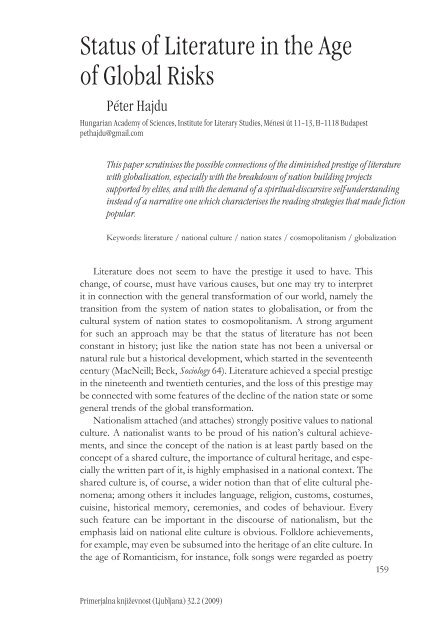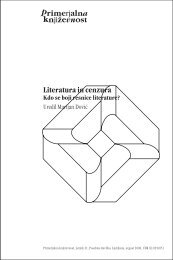- Page 1 and 2:
Primerjalna književnost, letnik 32
- Page 4 and 5:
PKn, letnik 32, št. 2, Ljubljana,
- Page 6 and 7:
PKn, letnik 32, št. 2, Ljubljana,
- Page 8 and 9:
PKn, letnik 32, št. 2, Ljubljana,
- Page 10 and 11:
PKn, letnik 32, št. 2, Ljubljana,
- Page 12 and 13:
PKn, letnik 32, št. 2, Ljubljana,
- Page 14 and 15:
PKn, letnik 32, št. 2, Ljubljana,
- Page 17 and 18:
Tomo Virk:Novi pristopi, stare zabl
- Page 19 and 20:
Tomo Virk:Novi pristopi, stare zabl
- Page 21 and 22:
Tomo Virk:Novi pristopi, stare zabl
- Page 23 and 24:
Tomo Virk:Novi pristopi, stare zabl
- Page 25 and 26:
Pripoved in dogodek. Razmišljanjeo
- Page 27 and 28:
Vid Snoj:Pripoved in dogodek. Razmi
- Page 29 and 30:
Vid Snoj:Pripoved in dogodek. Razmi
- Page 31 and 32:
Vid Snoj:Pripoved in dogodek. Razmi
- Page 33 and 34:
Vid Snoj:Pripoved in dogodek. Razmi
- Page 35 and 36:
Vid Snoj:Pripoved in dogodek. Razmi
- Page 37 and 38:
Vid Snoj:Pripoved in dogodek. Razmi
- Page 39 and 40:
Vid Snoj:Pripoved in dogodek. Razmi
- Page 41:
Vid Snoj:Pripoved in dogodek. Razmi
- Page 44 and 45:
PKn, letnik 32, št. 2, Ljubljana,
- Page 46 and 47:
PKn, letnik 32, št. 2, Ljubljana,
- Page 48 and 49:
PKn, letnik 32, št. 2, Ljubljana,
- Page 50 and 51:
PKn, letnik 32, št. 2, Ljubljana,
- Page 52 and 53:
PKn, letnik 32, št. 2, Ljubljana,
- Page 54 and 55:
PKn, letnik 32, št. 2, Ljubljana,
- Page 56 and 57:
PKn, letnik 32, št. 2, Ljubljana,
- Page 58 and 59:
PKn, letnik 32, št. 2, Ljubljana,
- Page 60 and 61:
PKn, letnik 32, št. 2, Ljubljana,
- Page 62 and 63:
PKn, letnik 32, št. 2, Ljubljana,
- Page 64 and 65:
PKn, letnik 32, št. 2, Ljubljana,
- Page 66 and 67:
PKn, letnik 32, št. 2, Ljubljana,
- Page 68 and 69:
PKn, letnik 32, št. 2, Ljubljana,
- Page 70 and 71:
PKn, letnik 32, št. 2, Ljubljana,
- Page 72 and 73:
PKn, letnik 32, št. 2, Ljubljana,
- Page 74 and 75:
PKn, letnik 32, št. 2, Ljubljana,
- Page 76 and 77:
PKn, letnik 32, št. 2, Ljubljana,
- Page 78 and 79:
PKn, letnik 32, št. 2, Ljubljana,
- Page 81 and 82:
Odgovor na kozmopolitstvo: uvodGali
- Page 83 and 84:
Responding to Cosmopolitanism.Prefa
- Page 85 and 86:
Theory and TraumaVladimir BitiInsti
- Page 87 and 88:
Vladimir Biti:Theory and Traumain E
- Page 89 and 90:
Vladimir Biti:Theory and Traumaity
- Page 91 and 92:
Vladimir Biti:Theory and Traumaart
- Page 93 and 94:
Cosmopolitan Sensus Communis:The Co
- Page 95 and 96:
Ulrike Kistner:Cosmopolitan Sensus
- Page 97 and 98:
Ulrike Kistner:Cosmopolitan Sensus
- Page 99 and 100:
Ulrike Kistner:Cosmopolitan Sensus
- Page 101 and 102:
Ulrike Kistner:Cosmopolitan Sensus
- Page 103 and 104:
Ulrike Kistner:Cosmopolitan Sensus
- Page 105 and 106:
Ulrike Kistner:Cosmopolitan Sensus
- Page 107 and 108:
Ulrike Kistner:Cosmopolitan Sensus
- Page 109 and 110: Ulrike Kistner:Cosmopolitan Sensus
- Page 111 and 112: Ulrike Kistner:Cosmopolitan Sensus
- Page 113: Ulrike Kistner:Cosmopolitan Sensus
- Page 116 and 117: PKn, letnik 32, št. 2, Ljubljana,
- Page 118 and 119: PKn, letnik 32, št. 2, Ljubljana,
- Page 120 and 121: PKn, letnik 32, št. 2, Ljubljana,
- Page 122 and 123: PKn, letnik 32, št. 2, Ljubljana,
- Page 125 and 126: The Future in the Margin:The Nation
- Page 127 and 128: Takayuki Yokota-Murakami:The Future
- Page 129 and 130: Takayuki Yokota-Murakami:The Future
- Page 131 and 132: Takayuki Yokota-Murakami:The Future
- Page 133 and 134: Takayuki Yokota-Murakami:The Future
- Page 135 and 136: Takayuki Yokota-Murakami:The Future
- Page 137 and 138: Takayuki Yokota-Murakami:The Future
- Page 139 and 140: Intertextuality andCosmopolitanism
- Page 141 and 142: Ziva Ben-Porat:Intertextuality and
- Page 143 and 144: Ziva Ben-Porat:Intertextuality and
- Page 145 and 146: Ziva Ben-Porat:Intertextuality and
- Page 147 and 148: Ziva Ben-Porat:Intertextuality and
- Page 149 and 150: Ziva Ben-Porat:Intertextuality and
- Page 151 and 152: Ziva Ben-Porat:Intertextuality and
- Page 153 and 154: Ziva Ben-Porat:Intertextuality and
- Page 155 and 156: Ziva Ben-Porat:Intertextuality and
- Page 157 and 158: Ziva Ben-Porat:Intertextuality and
- Page 159: Ziva Ben-Porat:Intertextuality and
- Page 163 and 164: Péter Hajdu:Status of Literature i
- Page 165 and 166: Péter Hajdu:Status of Literature i
- Page 167 and 168: Péter Hajdu:Status of Literature i
- Page 169 and 170: Péter Hajdu:Status of Literature i
- Page 171: Péter Hajdu:Status of Literature i
- Page 174 and 175: PKn, letnik 32, št. 2, Ljubljana,
- Page 176 and 177: PKn, letnik 32, št. 2, Ljubljana,
- Page 178 and 179: PKn, letnik 32, št. 2, Ljubljana,
- Page 180 and 181: PKn, letnik 32, št. 2, Ljubljana,
- Page 183 and 184: Svetovni literarni sistemMarko Juva
- Page 185 and 186: Marko Juvan:Svetovni literarni sist
- Page 187 and 188: Marko Juvan:Svetovni literarni sist
- Page 189 and 190: Marko Juvan:Svetovni literarni sist
- Page 191 and 192: Marko Juvan:Svetovni literarni sist
- Page 193 and 194: Marko Juvan:Svetovni literarni sist
- Page 195 and 196: Marko Juvan:Svetovni literarni sist
- Page 197 and 198: Marko Juvan:Svetovni literarni sist
- Page 199 and 200: Marko Juvan:Svetovni literarni sist
- Page 201 and 202: Marko Juvan:Svetovni literarni sist
- Page 203 and 204: Marko Juvan:Svetovni literarni sist
- Page 205 and 206: Marko Juvan:Svetovni literarni sist
- Page 207 and 208: Marko Juvan:Svetovni literarni sist
- Page 209 and 210: Marko Juvan:Svetovni literarni sist
- Page 211 and 212:
Marko Juvan:Svetovni literarni sist
- Page 213 and 214:
Marko Juvan:Svetovni literarni sist
- Page 215 and 216:
Literarnost kot medliterarnost,kozm
- Page 217 and 218:
Vanesa Matajc:Literarnost kot medli
- Page 219 and 220:
Vanesa Matajc:Literarnost kot medli
- Page 221 and 222:
Vanesa Matajc:Literarnost kot medli
- Page 223 and 224:
Vanesa Matajc:Literarnost kot medli
- Page 225 and 226:
Vanesa Matajc:Literarnost kot medli
- Page 227 and 228:
Vanesa Matajc:Literarnost kot medli
- Page 229 and 230:
Vanesa Matajc:Literarnost kot medli
- Page 231 and 232:
Vanesa Matajc:Literarnost kot medli
- Page 233 and 234:
Vanesa Matajc:Literarnost kot medli
- Page 235:
Kritike
- Page 238 and 239:
PKn, letnik 32, št. 2, Ljubljana,
- Page 240 and 241:
PKn, letnik 32, št. 2, Ljubljana,
- Page 242 and 243:
PKn, letnik 32, št. 2, Ljubljana,
- Page 244 and 245:
Presečišča literarne vedeMarko J
- Page 246 and 247:
PKn, letnik 32, št. 2, Ljubljana,
- Page 248 and 249:
PKn, letnik 32, št. 2, Ljubljana,
- Page 250 and 251:
PKn, letnik 32, št. 2, Ljubljana,
- Page 252 and 253:
PKn, letnik 32, št. 2, Ljubljana,
- Page 254 and 255:
O komentiranem izboru Cankarjevih k
- Page 256 and 257:
PKn, letnik 32, št. 2, Ljubljana,
- Page 258 and 259:
PKn, letnik 32, št. 2, Ljubljana,
- Page 260 and 261:
Agenda večkulturne SlovenijeJanja
- Page 262 and 263:
PKn, letnik 32, št. 2, Ljubljana,
- Page 264 and 265:
PKn, letnik 32, št. 2, Ljubljana,
- Page 266 and 267:
PKn, letnik 32, št. 2, Ljubljana,
- Page 269 and 270:
Mednarodni komparativistični kolok
- Page 271 and 272:
POROČILOkulture pokazala, kako avt
- Page 273 and 274:
Esej in singularnostMednarodna konf
- Page 275 and 276:
POROČILOdlje v preteklost; Ignacij
- Page 277 and 278:
POROČILOčrne luknje). To tipologi
- Page 279 and 280:
POROČILOprogramski brezosebnosti v
- Page 281 and 282:
POROČILOnormiranje interpretacije
- Page 283 and 284:
UDK 82.091Tomo Virk: New Approaches
- Page 285 and 286:
UDK 82.091:316.7Péter Hajdu: Polo
- Page 287:
GUIDELINES FOR AUTHORSPrimerjalna k
















